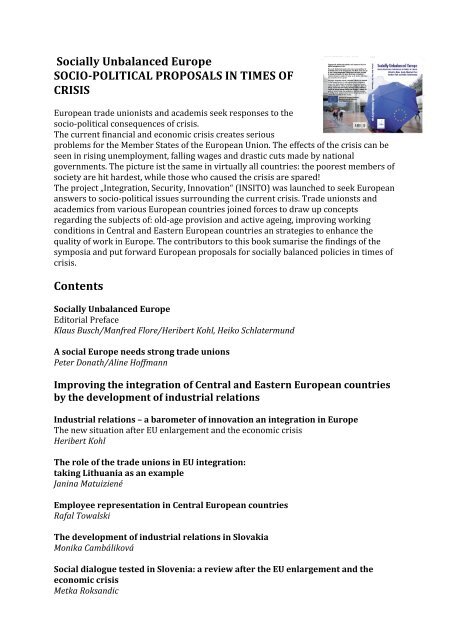Inhaltsverzeichnis englisch neu
Inhaltsverzeichnis englisch neu
Inhaltsverzeichnis englisch neu
You also want an ePaper? Increase the reach of your titles
YUMPU automatically turns print PDFs into web optimized ePapers that Google loves.
Socially Unbalanced Europe <br />
SOCIO-POLITICAL PROPOSALS IN TIMES OF <br />
CRISIS <br />
European trade unionists and academis seek responses to the <br />
socio-‐political consequences of crisis. <br />
The current financial and economic crisis creates serious <br />
problems for the Member States of the European Union. The effects of the crisis can be <br />
seen in rising unemployment, falling wages and drastic cuts made by national <br />
governments. The picture ist the same in virtually all countries: the poorest members of <br />
society are hit hardest, while those who caused the crisis are spared! <br />
The project „Integration, Security, Innovation“ (INSITO) was launched to seek European <br />
answers to socio-‐political issues surrounding the current crisis. Trade unionsts and <br />
academics from various European countries joined forces to draw up concepts <br />
regarding the subjects of: old-‐age provision and active ageing, improving working <br />
conditions in Central and Eastern European countries an strategies to enhance the <br />
quality of work in Europe. The contributors to this book sumarise the findings of the <br />
symposia and put forward European proposals for socially balanced policies in times of <br />
crisis. <br />
Contents <br />
Socially Unbalanced Europe <br />
Editorial Preface <br />
Klaus Busch/Manfred Flore/Heribert Kohl, Heiko Schlatermund <br />
A social Europe needs strong trade unions <br />
Peter Donath/Aline Hoffmann <br />
Improving the integration of Central and Eastern European countries <br />
by the development of industrial relations <br />
Industrial relations – a barometer of innovation an integration in Europe <br />
The new situation after EU enlargement and the economic crisis <br />
Heribert Kohl <br />
The role of the trade unions in EU integration: <br />
taking Lithuania as an example <br />
Janina Matuiziené <br />
Employee representation in Central European countries <br />
Rafal Towalski <br />
The development of industrial relations in Slovakia <br />
Monika Cambáliková <br />
Social dialogue tested in Slovenia: a review after the EU enlargement and the <br />
economic crisis <br />
Metka Roksandic
South-East Europe in times of crisis: The activities of the European Metalworkers <br />
Federation in this region <br />
Mina Vukojicic <br />
Pension and active aging as concepts of social security in Europe <br />
Lopsided reforms: The radical reorganisation of Bismarck’s public pension system <br />
in the EU <br />
Björn Hacker <br />
Policy of active ageing in the EU: Challenges and prospects <br />
Frerich Frerichs <br />
The open method of coordination and EU employment policy under the spezial <br />
consideration of active ageing <br />
Thomas Rhein <br />
Problems of pension policy in Germany <br />
Judith Kerschbaumer <br />
Active ageing in Poland – some issues with a relation to the labour market <br />
Jolanta Perek-Bialas <br />
Encouraging older workers to participate in the labour market <br />
The vision of the Dutch Federation of Trade Unions, FNV <br />
Isabel Coenen <br />
Extending working lives in Europe: employers’ opinions and actions <br />
Joop Schippers/Wieteke Conen/Kène Henkens <br />
Developing strategies for innovation through more quality of work in <br />
Europe <br />
Social imbalance in working conditions as well - an obstacle to economic success <br />
Ernst Kistler/Frank Mußmann/Falko Trischler <br />
On the necessity for and the path towards a „European Quality of Work Indicator“ <br />
Hans Preinfalk/Georg Michenthaler <br />
Quality of work and employment in the European Working Conditions Survey <br />
Erika Mezger/Greet Vermeylen/Agnès Parent-Thirion <br />
Possibilities and challenges for building a European Indicator on Job Quality <br />
Janine Leschke/Ramon PenaCasas/Andrew Watt <br />
Gender equality in Europe <br />
Designing gender-sensitive employment and social policies <br />
The gender perspective in the EU Post-‐Lisbon Strategy
Lydia Kocar <br />
The gender pay gap between the salaries of men and women: The case of <br />
Lithuania <br />
Daiva Atmanaviciene <br />
Perspectives <br />
The global economic crisis, the Euro crisis and the future of the European social <br />
model <br />
Klaus Busch <br />
Contributors <br />
INSITO Project Partners <br />
Country codes in the figures












